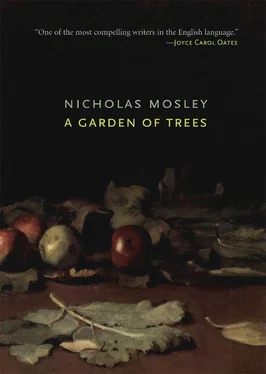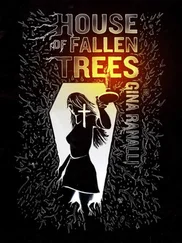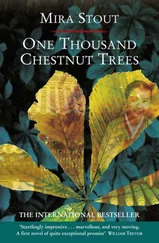“Now?” she said. “Is not that for you to tell me?”
“Yes,” I said. I sat in the shape of a thought that has been forgotten.
“And can you tell me?”
“No,” I said.
“Perhaps you do tell the truth,” she said. “Perhaps that is why Marius brought you.”
“Yes,” I said.
The light from the room was white like an arc light: time had come in on us like an awakening into snow. The eyes emerging out of darkness and birth were pained and blinded by the weight of the sky. I looked towards the door beyond which shadows ran softly. “I will tell you tommorrow,” I said.
“Thank you,” she said.
I stood up. Her face was still like paper and her hands like shells. “Goodbye,” I said.
“Goodbye,” she said.
Outside it was raining and the wind had stopped.
Marius was standing beneath a lamp post at the end of the street. I joined him. “Let’s walk,” I said. He followed me round the corner to where the road ran down like a switchback. “Why was it not love with her?” I said.
“Because she was afraid of it.”
“Why?”
“Because it is frightening.”
“That is not the point,” I said.
“No,” he said. When he spoke he spoke quickly as if his life depended on it.
“Then why was it with her?”
“Because to her there was nothing else except the two of us.”
“That is what she said. Have you then worked it out and arranged it like a plea all stamped and docketed and legal?”
“And are you prosecuting me?”
“Yes,” I said. We walked beside the buses that crawled like something wounded.
“I did nothing,” Marius said. “I just stood there.”
“And to you there was something else besides the two of you?”
“That is not for me to say.”
“That is what she said. And if you had not stood?”
“What?” he said. “And what should I have done?”
“I don’t know,” I said. “I don’t know at all.”
“Neither do I,” he said.
At the bottom of the hill there was a crossroads in which the buses were wedged like lice. “Would you have stopped it if you could?” I said.
“That is no question,” he said. “It happened. I stood there and she destroyed herself.”
“Did not you destroy her?”
“I tell you again, it happened.”
“Then tell me,” I said.
“What?” he said.
“Oh nothing, nothing. . ”
“I tell you,” he said, “I had been thinking. For months I had been thinking. Don’t other people think?”
“Oh yes,” I said.
“And I discovered something. Well?”
“And she destroyed herself!”
“Yes.”
“Why do you put it like that? Is it necessary to defend yourself?”
“Yes,” he said. “It is.”
“Then I hate you for it.”
We walked in silence. It seemed to me that I was destroying everything.
“Listen,” I said. “I am not saying that you destroyed her. I am saying that what you had discovered did.”
“What does this mean?” he said. “Some men are destroyed when they look on death. Is that death’s responsibility?”
“You cannot talk about death’s responsibility,” I said.
“All right then.”
“But what happened was wrong. And you can talk about man’s responsibility.”
“All right.”
“And you are a man.”
“How comforting!” he said. I suddenly realized how much he was suffering.
“So that it is your responsibility,” I said. “And are you trying to say that it was worth it?”
“I will not use your words,” he said.
“Then what words will you use?”
“None,” he said.
“You have used them to justify yourself.”
“Because you were attacking me.”
“I am attacking you now,” I said.
We walked on. “What is it that you are asking?” he said.
“I am asking whether you hold yourself responsible for the effects that you have on others.”
“I hold myself responsible for my actions,” he said, “but not for what I am.”
“And you define your actions rather easily,” I said.
“It is not a difficult definition.”
“It is a limited one. And why do you not hold yourself responsible for what you are?”
“Because I believe in God.”
“God?” I said. “Why not the devil?”
“Because the devil is concerned with actions.”
“And what you are is the concern of God?”
“Yes,” he said, “fundamentally.”
“That must give you comfort,” I said.
He turned on me furiously. “Listen,” he said, “There are things in which you believe, in your inmost soul you believe, and they are the concern of God. If you have searched into your soul and have found something, if you have reached and can reach no further, then there, what you have found, that is God. You cannot deny that. You cannot deny that God. You may be wrong, for you may not have reached far enough, and you may forget what you have found, but if you believe something honestly then that is your God for you, and you can never deny it, never, no matter what may be its effects and its catastrophes.”
“Is it not by its effects that you should judge it?”
“I do not judge,” he said. “How can I judge it? There is a law and a truth that is beyond judgment. What you are trying to make me say is that my belief is a belief of the devil because a person was destroyed when she looked on it. You hold responsibility as a judgment against my belief. And I am saying that I accept responsibility for every decision at every time, but with judgment I am not concerned. The belief is God’s and the judgment is God’s, and the catastrophes are just what happen.”
“What then is your responsibility when your wife is destroyed?”
“My responsibility is that I will not tell you, but it is not to deny my God.”
“Why will you not tell me?”
“Because you would sneer.”
“And are you frightened of that?”
“I am not frightened for myself but for you.”
“Are you frightened for me when you would destroy your wife and pray to your God all in one breath and in the name of love?”
“Yes I am frightened, and yes then that is my responsibility to pray to my God, and I will tell you this, that you do not know what love is, you have no conception of what love is, you do not know about love at all.”
“Do you?” I said.
“Ask someone else,” he said.
“Your wife?”
“Yes,” he said; “Ask her, ask my wife,” and he turned away from me and walked off violently into the crowd where he disappeared like a bubble in a swirl of water.
I stood at the crossroads. I thought: There is madness, now. Outside the playground there is nothing but madness. Secrets should never be told. Secrets should never be told. I repeated this, endlessly.
The world went past me. What Marius has talked about is madness. The secret is horror, horror is at the centre, there is nothing but horror. Perhaps it is myself who is mad.
The rain was green as if the world was drowning. All this has happened too quickly, things do not happen so quickly as this. Out beyond the railings, across the waiting world, time has foundered like a wreck on the rocks. They say that to a drowning man time is speeded so that all his life is in one second. What is it that he remembers? Marius said it was eternity. Perhaps, after all, he only remembers what has been left undone.
What is Marius? He said it was tragedy. He said that nothing can happen until there was tragedy. Once there were no conflicts and now that there is a conflict what can happen now? Perhaps conflicts are of the imagination, like the games of children. That is one thing I should have learned, from the sense of madness.
Читать дальше












